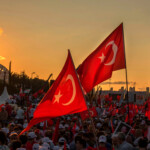‘A mass “de-politicisation” among oppositional social groups is not a distant possibility. We are drifting towards a situation in which everyone focuses on their own individual struggle for survival, leaving the governance of the country entirely to those at the ‘top’. In other words, a situation in which society—at least the oppositional half of it—completely withdraws from politics.’
Observing the enthusiasm of the newly elected CHP deputies in Parliament, I thought for a moment that its leader, Kemal Kılıçdaroğlu, actually had won the election. There couldn’t have been a better scene to show how much the “institutional opposition”—the party—has become detached from the “social opposition”—the electorate.
The ’emotional gap’ between this CHP’s elected members and the voters, who have not yet recovered from the trauma of election defeat, demonstrates the end of “socially-based oppositional politics” within the political parties.
Despite the joy of the opposition elite, the voters are profoundly unhappy. They have been waiting since the local elections in 2019, when their hopes were revived, to beat the ruling party at the ballot box.
Motivated by the opposition candidates winning over 50 per cent of the votes in Istanbul and Ankara, they were almost made sure that it would happen this time.
But the result has been a deep disappointment. The opposition suffered a heavy defeat in a vital, perhaps the last, “fairly free”, election. People’s hopes were shattered. They now feel that they are left alone and alienated from the country that they live in but were unable to change in any meaningful way.
People even feel abandoned by the parties they voted for and the leaders they followed. This is an immense social trauma. They will live whatever is left of their future in a country where they feel excluded.
The opposition masses are now left alone and helpless in the face of an authoritarian state that has half of society behind it: they have no civil organizational network, no political party, and no leader to rely on.
The only thing they are left with is anger. And the target of their fury is no longer the government, but the opposition parties and leaders they voted for—those who could not bring about change.
It will be very difficult to get this group of people, who have experienced a deep emotional rupture, to the polls in local elections nine months from now.
People no longer have confidence in parties, leaders, or candidates. Rather than experiencing a new round of disappointment, voters may prefer not to hope for change anymore. This means not going to the polls in the local elections, and not starting a race in which they think they will lose again.
A mass “de-politicisation” among oppositional social groups is not a distant possibility. We are drifting towards a situation in which everyone focuses on their own individual struggle for survival, leaving the governance of the country entirely to those at the ‘top’. In other words, a situation in which society—at least the oppositional half of it—completely withdraws from politics.
This situation is a blessing for an authoritarian regime. People who have lost hope for change, who have become disconnected from their political representatives, who have left politics entirely to the rulers, who have retreated into their shells, and most importantly, who have lost their resilience, show that those in power have fully established their hegemony.
But all of this could have been avoided, even after the loss of the election. An opposition that received 48 per cent of the vote is a powerful social and political bloc.
Moreover, the opposition voters who are more educated and living in more developed metropolitan areas of the country could have preserved their confidence that the future belongs to them, even after such an electoral defeat.
Such a feeling would not have been unwarranted, as they represent the most dynamic and productive segments of the country. Rallying such a dynamic and mobilized social group behind the opposition parties could have kept significant political pressure on the government, and the government in turn would have found itself restrained by such a powerful alliance of social and political opposition.
It didn’t work that way. The opposition parties proved not to be as resilient as the masses they received votes from. They have been totally paralyzed by the election defeat. The result was probably a bigger shock for the opposition parties than for the ordinary opposition voters.
Before it took place, the opposition party elites had already won the election in their minds, shared the power among themselves, and even sat idly in their offices.
They were hallucinating. They had never listened to those who warned, “Focus on how to win the election, not on how and with whom you will govern after the election”.
As soon as they realized that they were daydreaming and had already lost, the party elites retreated to the offices they held, closed the doors of their parties from the inside, and started to defend the position they hold.
The opposition parties (the CHP and IYI Parties in particular) have rapidly turned their backs on their voters, who ask for a change in leadership and in party administration. It appeared that the priority of the party elites was to preserve their position in the party hierarchy, not to respond to the demands of the voters.
A sense of abandonment by their political representatives further devastated the social opposition, weakening their resistance and turning their disappointment into anger.
The parties’ attitude that “the election is over, you go about your business, we go to our party” eroded the political mobilization and hope that had defined the social opposition.
Again, opposition parties could have kept the 48 percent of the electorate who voted for them mobilized, dynamic, and hopeful for change if they had started moves to implement the change they said they would make in Turkey before the elections, responding to the demands of their voters right away after the election defeat.
Anticipating divisions within the opposition block, they could have shown that ‘change without disintegration’ in opposition parties is possible. By keeping the social opposition awake and alive on the one hand and renewing the leadership that lost elections on the other, they could have prevented the disintegration of that powerful 48 per cent, and even expanded it before the March 2024 local elections.
Maintaining the unity and vitality of the opposition was critical because, despite the defeat, a 48 per cent vote against Erdogan meant the existence of a very substantial social resistance and political power.
Despite 21 years of AKP rule, all kinds of governmental suppression, the whole state becoming an apparatus of the party, and a propaganda network that would make totalitarian regimes envious (etc., etc.), 48 percent votes for the opposition establishes that half of the population in Turkey has not been subdued by the powerful.
The votes received by the CHP and IYI Party were equal to that of the AKP—that is, the two opposition parties in an alliance could outweigh the ruling party.
So there was still hope.
If the aftermath of the election had been managed well, the opposition could still have been potent and forceful. For the first time since the 2013 Gezi protests, the social opposition and the institutional opposition had merged and come together, and the social opposition had found its political representatives. This could have been sustained.
But it wasn’tt. The two main opposition parties, aspiring to power, could not manage the election night or the aftermath. They closed in on themselves. They were in a rush to protect their “positions” within their own political parties and no longer interested in the future of a united opposition front.
As such, the social opposition now faces the risk of dissolution and the institutional opposition encounters the possibility of disintegration.
If the demands for renewal and change in the opposition parties are not taken into account, and action is not taken seriously and quickly, the institutional opposition in Turkey will be no different from the opposition in Russia or Azerbaijan; it will turn into an ineffective “official” opposition without any social or political capital.
However, such a dark and chaotic future can also be an opportunity for transformation and renewal. If the opposition parties that aspire to change Turkey have themselves become part of the status quo, the dynamics of change can meet with social forces somewhere outside the political parties.
The views and opinions above are the author’s and do not represent those of the Free Turkish Press.


